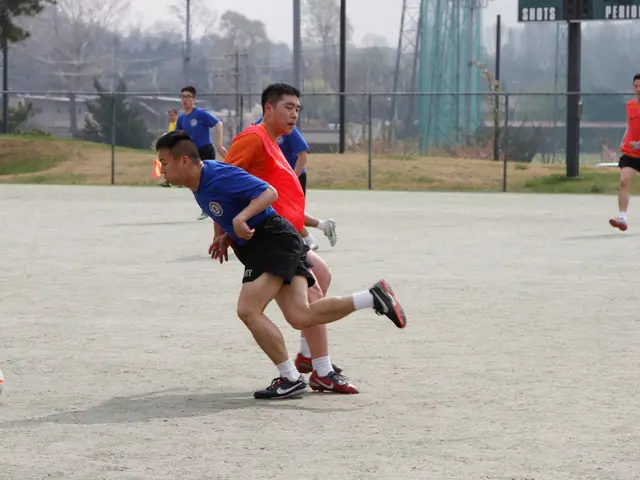"Riders grapple with life beyond competition: admitting the slim chances of becoming the world's best in any field"
Revised Article:
The aftermath of a career spent racing at the highest level can hit athletes hard, as Sir Jason Kenny, Britain's most decorated Olympian, experienced. "Once you stop racing," he says, "you find yourself trying to figure out your worth and place in the world. I defined myself through my performance. When that's taken away, you have to find a new way of seeing yourself."
It's not just Olympians who feel this way. When your daily routine revolves around fitness, personal bests, and team camaraderie, stepping away can be a struggle. "The transition away from sport can be tough, even for amateur athletes," says sports psychologist Peter Hudson.
For Kenny, quitting cycling felt like entering a new chapter of life, similar to a teenager leaving home for university. "Until I was 33, my place in the world had been dictated by my performance in cycling. I never had to work out my place outside of that."
For some, such as Geraint Thomas, due to retire at the end of this year, the decision can be especially daunting. "There's a fear when you quit," adds Kenny. "Even if you're moving on to something great, it's a big life change, and your whole world has been centered around racing a bike."
Kenny's transition has been relatively smooth, as he took on a sprint coach role with British Cycling. Some of his peers, however, have struggled. The intensity of modern cycling, with sponsorship, numerous races, and high performance expectations, can make the transition even more challenging when it ends abruptly.
"Retiring from cycling is like having the rug pulled from under your feet," explains Hudson. "All of a sudden, you have this unstructured time, and the adjustment can be very difficult." This difficulty reflects in the staggering number of former athletes who battle mental health issues after leaving their sport.
A 2023 study published in the journal Advances in Psychiatry and Behavioural Health found that up to 20% of athletes experience anxiety, depression, and post-traumatic stress disorder after leaving competitive sport. Mental health struggles often stem from the sudden loss of routine and identity so closely tied to their sport.
Financial difficulties can compound the issue, as seen in the case of Bradley Wiggins, who has openly struggled with lost identity and purpose, as well as financial problems, after leaving cycling.
Experts believe that up to 50% of professional cyclists face financial distress or potential bankruptcy within five years of retirement, due to a lack of financial literacy and guidance during their careers.
Professor Jamie Anderson, who mentors former pro riders, believes that a rider's family background and the "bubble of sanity" surrounding them can play a significant role in how they fare after retiring. "Many riders may not have the financial literacy or the support to manage their earnings wisely," he warns.
For some riders, the decision to quit is not within their control. "As a rider, you feel it coming," explains 38-year-old Belgian Ben Hermans, who announced his retirement in January after failing to secure a new contract with Cofidis. "Because I still loved racing my bike, I was always hoping to keep going. But it was the first time in my 16-year career that I was ready to continue - and also ready to stop."
Cycling's administrators have a responsibility to ensure riders are better prepared for a life after competition, but some argue that they are not taking their duty of care seriously. "Teams should provide more financial and educational support, and former pros should be encouraged to become mentors," suggests Anderson.
For riders like Imogen Cotter, the decision to quit can be made easier by not tying your self-worth to the sport. Cotter, who retired in April 2024, struggled with the psychological impact of a near-fatal collision while training in Spain in 2022.
"I used to think quitting cycling would be miserable because I wouldn't have anything to work towards," she says. "But when it came to giving it up, I had no regrets. I won the National Championships, fought my way back after the crash - I'm proud of that. It just didn't fit my life anymore."
Despite organizations like British Cycling offering support to riders looking to move on, much of the emphasis is on the rider to find their feet independently. "We have a form of performance lifestyle support," says Kenny, "but it's usually up to the rider to take advantage of it."
It's not just professional riders who struggle with the transition; amateurs face similar challenges when stepping away from the structure and social network of cycling. One such rider is 47-year-old American Josh Ross, who found himself lost and struggled with his mental health after quitting cycling.
"Cycling was my entire life," he admits. "When I left the sport, it was like losing a family. I had to find new ways to cope and create a new identity." Learning to live without the constant competition and social interaction that cycling offers can be a challenge, but with the right mindset and support, it is possible to find a new purpose.
[1] "Retirement Transition: Psychological and Emotional Challenges for Athletes" - Sports Psychology Today[2] "The Challenges Faced by Retiring Elite Cyclists" - The Journal of Clinical Sports Psychology[3] "Post-Retirement Struggles: A Look at Mental Health Issues in Former Elite Athletes" - Psychology Today[4] "Coping Mechanisms for Retired Athletes" - National Institute of Mental Health
- "For those who find fulfilment in gravel cycling, the transition from competitive sports might not be as daunting, offering an opportunity to explore health-and-wellness while maintaining a connection to the sport."
- "Amidst the mental-health struggles that often arise post-retirement, it's crucial for riders to prioritize self-care and seek support, whether from sports psychology experts or fellow health-conscious cyclists."








